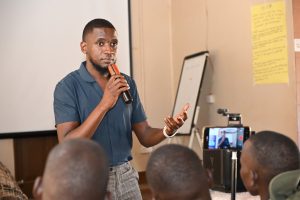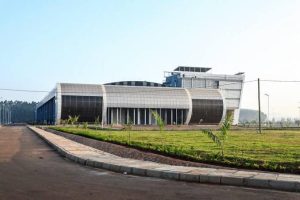
UCC’s digital skills training unlocks content creation opportunities
By Adam Walusimbi In today’s digital age, many young people aspire to earn a living through content creation. However, procrastination often hinders their dreams, as they wait for the perfect equipment, timing, or financial resources to begin. At a recent one-week digital skills training program in Asuret Sub-County, Soroti District, Moses Kiboneka, widely known as Uncle Mo, an award-winning digital content creator, encouraged the youths to take immediate action. He shared valuable insights, emphasizing that the best time to start is now, rather than postponing their ambitions. Speaking to the attendees, Uncle Mo highlighted his own journey. As a mechanic, he found himself out of work during the 2021 COVID-19 lockdown when car repairs shrunk. This unfortunate circumstance led him to create a “newsletter-commentary show” from his garage, launching his popular YouTube channel, “I Am Uncle Mo.” “I began with the most basic equipment—a borrowed phone and a friend as my camera operator,” he explained. “If I had waited for better resources, my channel might never have existed. You must start now!” Today, Uncle Mo’s channel boasts over 85,600 subscribers and 6.3 million views, allowing him to generate income from YouTube ads and collaborate with major brands. One participant, George William Eumu, described the training as “eye-opening.” Previously, he viewed his smartphone as a tool for basic tasks. “Now I know I can use my phone to do graphics design and video content creation,” he shared. Winnie Byanyima (no known relations with the Executive Director of UNAIDS) expressed her enthusiasm as well. She highlighted how the training boosted her aspiration to become a content creator. “The facilitators encouraged us to ask questions and demonstrated how the apps are used, making it very educational,” Byanyima noted. Interacting with Uncle Mo also added significant value to the training, motivating her further. Tom Vincent Olobo, the Senior Assistant Chief Administrative Officer for Asuret Sub-County, conveyed gratitude to the Ugandan government for selecting Soroti for this training initiative. He encouraged the Uganda Communications Commission (UCC) and Prime Time Communications to expand the program throughout the district. “Seeing over 100 youths participate in the ICT and multimedia skilling program brings me joy,” said Olobo. “I believe these young people can apply their skills to alleviate poverty and also teach their peers. I urge the UCC and government to extend this valuable training to other areas of Soroti.” The Soroti District training marked the conclusion of a larger digital skills program implemented by Prime Time Communications, which began in early 2024 and spanned 10 districts, including Masaka, Bukomansimbi, Lwengo, Sembabule, Kalungu, Mayuge, Bugiri, Pallisa, and Busia. More than 1,000 youths have participated in this digital skilling program. Initiated by the UCC under the Uganda Communications Universal Service and Access Fund (UCUSAF), this initiative aims to equip youths with essential digital skills, such as multimedia applications, social media marketing, and content creation, enabling them to create sustainable jobs in the digital economy. Denis Jjuuko, Team Leader at Prime Time Communications, attested to the positive impact of the program. “We have observed enthusiastic participation across all districts, and the trainees have produced impressive, professional-quality videos, graphics, and multimedia content despite having limited resources,” he said. “With continued training and tech-focused funding, Uganda’s youths have the potential to transform the nation.”Eng. Susan Nakanwagi, the UCUSAF technical manager, confirmed that the digital skilling program, now in its third year, will expand to more underserved districts in the 2025/2026 financial year due to its significant impact on the youths.

